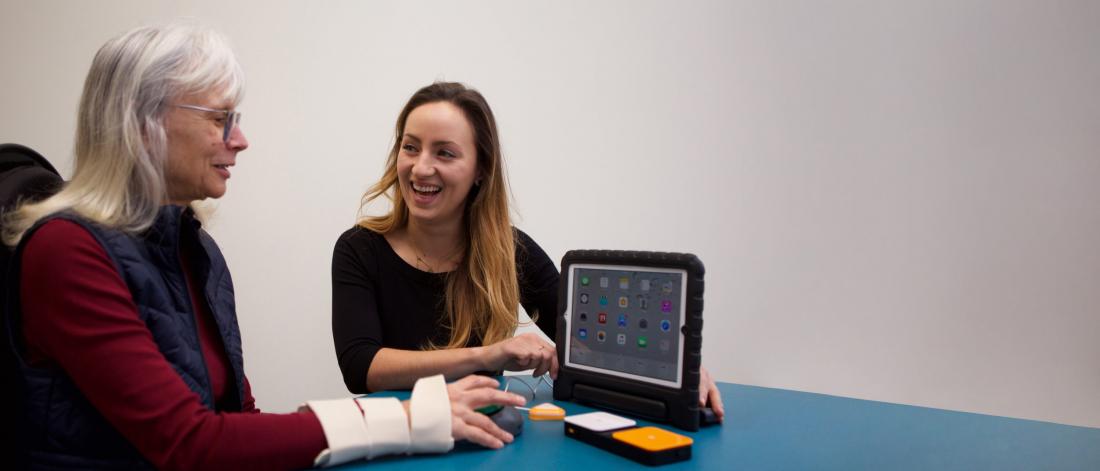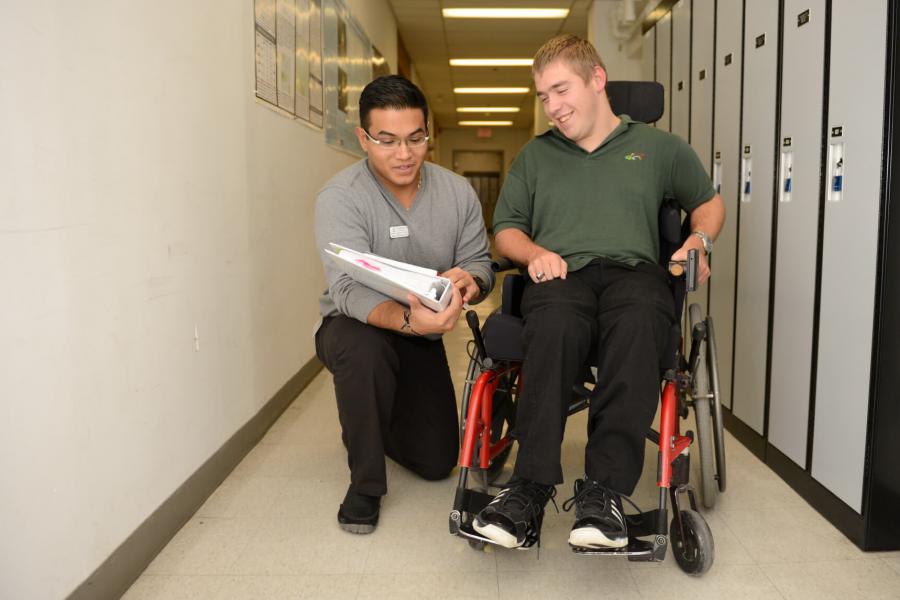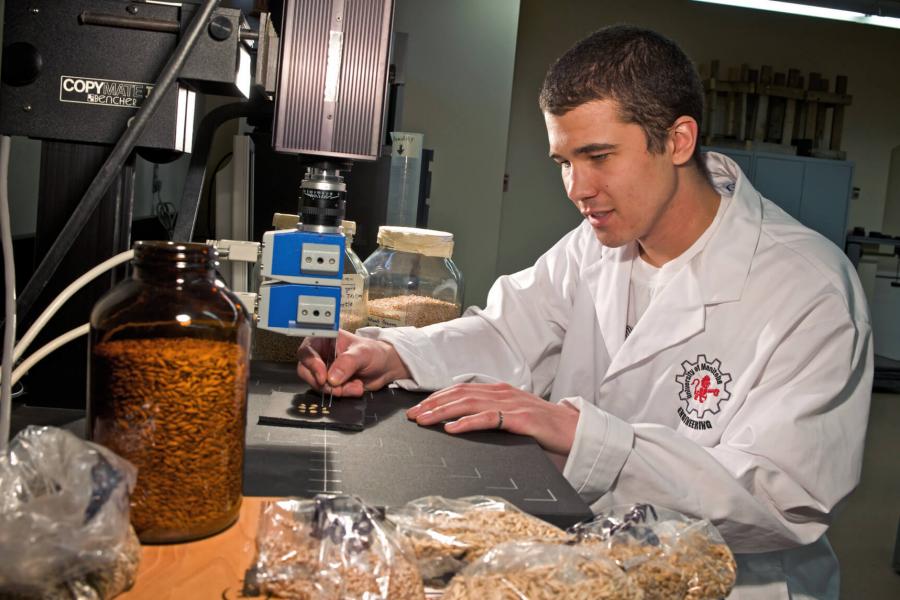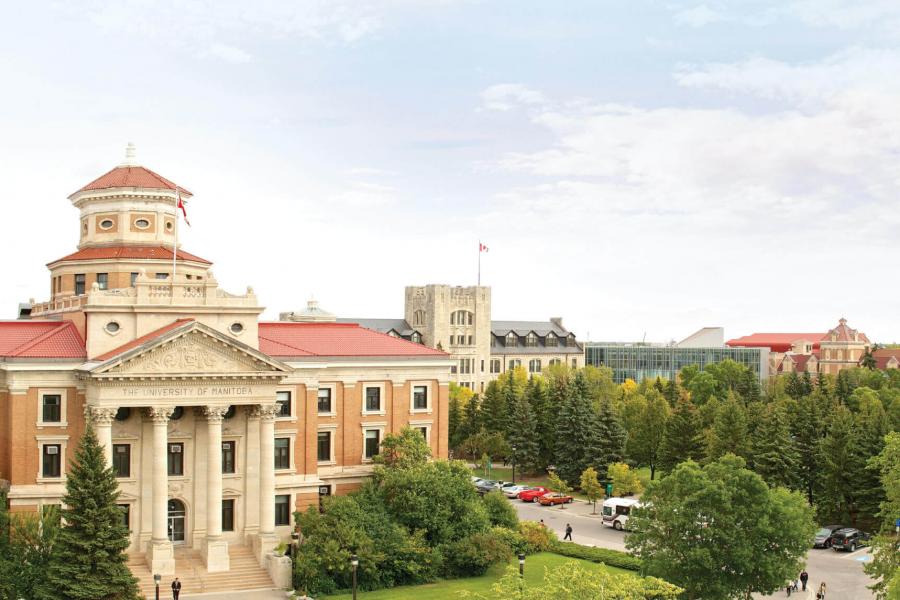
The MOT Graduate
The MOT graduate is an entry-level occupational therapist able to perform the entry level roles and functions of an occupational therapist. The MOT graduate has knowledge related to the theories, concepts, and principles of occupation, occupational participation, and occupational therapy. The MOT graduate employs a collaborative relationship-focused approach and understands the importance and consequences of the interactions between people or collectives, their context (micro, meso, macro), and their occupations.
The MOT graduate is a self-directed, lifelong learner, who demonstrates reflexivity, critical thinking, and problem-solving strategies. The MOT graduate demonstrates leadership and advocacy skills and can address complex and changing needs across various systems and sectors: social services, education, employment, justice, and health. The MOT graduate has an awareness of human rights issues locally and globally, demonstrates cultural humility and safety, recognizes and respects equity and diversity, and works to facilitate an inclusive, just, and equitable society that promotes occupational participation.
The MOT graduate takes responsibility for managing their practice effectively and efficiently, for supervisory functions of students, support workers, or others, and for participating in quality improvement activities. The MOT graduate also takes responsibility for self-appraisal of professional development needs, is a critical consumer of research evidence, respectful of multiple worldviews, incorporating these into practice.
We value:
Relationality and relational accountability | Wahkotowin
Occupational therapists have responsibilities and obligations to uphold in their relationships and to live in a way that respects the interconnectedness of all things. We are not individuals acting alone, but rather we exist in relation to others (kinship) and are accountable to those relationships (reciprocity) (Shawn Wilson, 2008). We recognize that relationships are central to occupational therapy practice.
Working in good ways | Mino-Wîcihtowin
Occupational therapists engage in collaborative relationships that are contextually relevant, and nuanced based on respect, relevance, responsibility, and reciprocity. We work in good and ethical ways, when engaging with colleagues, students, clients, and communities, within and beyond the university. We engage in a collective process that involves sharing with one another to foster authentic partnerships and reciprocal learning experiences. Occupational therapists engage in ethical relationships with humility, care and respect.
Wholistic health and well-being | Minoayawin
Occupational therapists promote meaningful participation in daily occupations that focus on physical, emotional, mental, and spiritual fulfillment. Occupational therapists practice wholistically centering their interventions around the person’s interconnected relationships with self, family, and community.
Equity, diversity, inclusion, access, and participation | Mino-Pimatisiwin
Occupational therapists recognize and respect the multiple and intersecting identities of individuals. We strive to identify and remove barriers to equity, inclusion, access, and participation and foster diversity in human resources, research, service, and within the student population. We integrate anti-oppressive and anti-racist approaches in practice. We support a holistic, balanced, relational approach to life, grounded in respect for self, others, the land, and all living things. We value individual and collective well-being.
Professional accountability
We uphold the ethics, behaviours, and responsibilities expected of a professional, or a professional-in-training while also recognizing and valuing the diverse perspectives, expressions, and experiences that make up professionalism. We value ongoing learning, reflection and reflexivity as ways to grow and develop professionally. We always consider ethical implications and risk to self and others when practicing. We must consider how cultural, generational, racialized, gendered and/or dis/ability-related differences in lived experience might shape our interpretations of professionalism. Standards of professionalism must adhere to fundamental principles of client welfare and autonomy, inclusivity, accountability and equity rather than as implicit measures for belonging and exclusion.
Evidence-informed practice
We actively participate in the generation, integration, evaluation, and translation of evidence to support occupational therapy education and practice. We use evidence as the basis for innovation in education, research, and practice while respecting, recognizing and integrating multiple perspectives, knowledge systems, and worldviews. We consider a wide range of evidence sources and contextual factors to inform decisions. We acknowledge that different cultures, disciplines, and individuals may have distinct ways of knowing, producing, and interpreting evidence, and we value these differences.
Program details
Master of Occupational Therapy
Expected duration: 2 years
Tuition and fees: Two year’s tuition, then continuing fees in subsequent years (refer to Graduate tuition and fees)
The Master of Occupational Therapy curriculum uses wide-ranging teaching methods, recognizing that students have different learning styles. You can view the program structure (PDF).
Teaching methods are organized into four categories:
Large group teaching: didactic lectures, micro-teaching, workshops, sharing/talking circles, land-based teaching, storytelling
Small group teaching: tutorials, break-out sessions, seminars, labs, problem-based learning, team-based learning, consultative sessions
Blended learning: flipped classroom, asynchronous on-line content delivery
Experiential learning: simulation, community engaged learning, fieldwork
Fieldwork is interspersed throughout the program and progresses from basic to advanced.
Master of Occupational Therapy - Accelerated Program
Expected duration: 1 year
Tuition and fees: One year’s tuition, then continuing fees in subsequent years (refer to Graduate tuition and fees)
The Master of Occupational Therapy accelerated program includes 12 credit hours of academic course work from the Master of Occupational Therapy program or equivalent.
Only individuals with a Bachelor of OT who have completed the CAOT exam or are eligible for registration with the College of Occupational Therapists can complete the Master of Occupational Therapy - Accelerated Program.
Course offerings (two year program)
| Year | Course Code | Course Title |
|---|---|---|
| Year 1 | OT 6100 | Human Determinants of Occupational Performance |
| OT 6110 | Fundamentals of Occupational Therapy Theory | |
| OT 6122 | Foundations of Health and Well-being | |
| OT 6130 | Occupational Therapy Practice Skills 1 | |
| OT 6142 | Professionalism and Enabling Occupation | |
| OT 6190 | Fieldwork Preparation | |
| OT 6200 | Basic Fieldwork | |
| OT 6300 | Analysis of Occupation | |
| OT 6310 | The Environment and Occupational Performance | |
| OT 6320 | Health Conditions and Occupational Performance | |
| OT 6330 | Occupational Therapy Practice Skills 2 | |
| OT 6352 | Foundations of Evidence-informed Occupational Therapy | |
| OT 6400 | Intermediate Fieldwork 1 | |
| Year 2 | OT 7542 | Professionalism and Leadership in Enabling Occupation 1 |
| OT 7560 | Occupational Therapy Process 1 | |
| OT 7572 | Occupational Therapy Practice Skills 3 | |
| OT 7600 | Intermediate Fieldwork 2 | |
| OT 7742 | Professionalism and Leadership in Enabling Occupation 2 | |
| OT 7752 | Critical Inquiry Research Project | |
| OT 7760 | Occupational Therapy Process 2 | |
| OT 7772 | Occupational Therapy Practice Skills 4 | |
| OT 7800 | Advanced Fieldwork |
For full course descriptions or to view the supplementary regulations , please visit the Academic Calendar.

Accreditation
The Master of Occupational Therapy program at the University of Manitoba
underwent an accreditation review in March 2019 by the Canadian
Canadian Association of Occupational Therapists (CAOT), the national
accreditation body for occupational therapy programs. The program
received a full seven-year accreditation from 2019 to 2026.
Internationally educated health professionals
Internationally educated health professionals should visit the access hub for details related to obtaining Canadian credentials.
Admission requirements
Master of Occupational Therapy admission requirements
Program prerequisites:
The master of occupational therapy is a graduate program, which means you must complete an undergraduate degree, including several required and recommended courses, before you can be considered for admission.
General requirements:
In addition to the admission requirements described here, all applicants must meet the minimum admission and English language proficiency requirements of the Faculty of Graduate and Postdoctoral Studies.
English language proficiency:
An acceptable English language proficiency test score is required, if applicable. Note that occupational therapy requires scores above the Faculty of Graduate and Postdoctoral Studies minimum requirement, as follows:
- International English Language Testing System (IELTS): A minimum overall score of 8.0 on the Academic Module.
- Test of English as a Foreign Language (TOEFL) Internet-Based Test (iBT): A minimum total score of 100 is required, with a score of 22 in each of reading, writing, listening, and speaking.
NOTE: Only these test types will be accepted.
Master of Occupational Therapy - Accelerated Program admission requirements
Eligibility criteria:
To qualify for admission to the master of occupational therapy accelerated program, you must have:
- A minimum of a Bachelor of Medical Rehabilitation (Occupational Therapy) degree or equivalent
- Evidence of having passed the Canadian Association of Occupational Therapists (CAOT) certification examination and/or eligibility for registration in Manitoba by the College of Occupational Therapists of Manitoba (COTM)
NOTE: Applicants to the accelerated program are advised to contact the Head of the Occupational Therapy Department prior to applying as admission to the program is dependent on the resources available in any given year.
How to apply
Master of Occupational Therapy
Application deadlines:
Applications for the master of occupational therapy program are accepted once a year for fall entry.
Application requirements:
Applications must be completed online and include several parts:
- Application fee (non-refundable)
- Unofficial copies of transcripts
- Proof of English language proficiency, if required
- Casper test
Instructions:
Please read the Faculty of Graduate and Postdoctoral Studies online application instructions and MOT Applicant Admission Requirements before beginning your application.
Virtual admission interviews
Date: MOT admission interviews will take place on Saturday, April 25, 2026.
Interview invitations: The MOT admissions committee will invite a select number of students to participate in the admission interview as part of the student selection process. These invitations will be extended approximately one month before the interview date.
Interview format: Applicants selected for the interview stage will complete an online 20-minute interview.
Additional information: Further details will be provided to applicants scheduled for interviews before the interview date.
Master of Occupational Therapy – Accelerated Program
Application deadlines:
Applications for the master of occupational therapy accelerated program are accepted twice a year for fall and winter entry.
Application requirements:
Applications must be completed online and include the following:
- Application fee (non-refundable)
- A bachelor of medical rehabilitation (occupational therapy) degree or equivalent
- Successful completion of 42 credit hours outside of the bachelor of medical rehabilitation (occupational therapy) degree
- Proof of Canadian Association of Occupational Therapists (CAOT) results
- Two letters of recommendation
Instructions:
Please read the Faculty of Graduate and Postdoctoral Studies online application instructions and MOT Accelerated Applicant Admission Requirements before beginning your application.
Application deadlines
Casper test
About the CASPer test
Applicants to the Master of Occupational Therapy program in the College of Rehabilitation Sciences are required to complete the Casper test.
This online evaluation assesses personal and professional characteristics that we believe are important for successful students and graduates of our program.
Assessments offered by Acuity Insights include Casper and Duet. Casper is the only one that you must complete.
Test results are only valid for one admissions cycle. Therefore, even if you have taken Casper in the past, you will still be expected to retake it.
You will need
To take the Casper test, you must have access to:
- A laptop or desktop computer
- A webcam
- A microphone
- A reliable high-speed internet connection (at least 1.5 Mbps download speed and 2 Mbps upload speed)
- A valid email address (the same one you will use to submit your application)
You must also be prepared to present government-issued photo ID.
Registration
To register for the Casper 2 (CSP-10211) test, visit Acuity Insights and register under your specific country using a piece of government-issued photo ID.
Ensure you select Masters in Occupational Therapy, University of Manitoba for distribution before the posted distribution deadline.
When registering, use an email address that you check regularly and that you have used for your application, as there may be updates to the test schedule.
You will be provided with a limited number of testing dates and times, which have been pre-arranged and approved by your program according to admissions timelines.
Please note that these are the only testing dates available for your Casper test based on your program selection. Additional test dates will not be scheduled.
Important: To account for identity verification and payment processing, ensure that you register for your test at least three days before your preferred test date and time. Last-minute bookings are not recommended.
Requesting accommodations
If you require testing accommodations for Casper , you will need to submit the accommodations request form at least four weeks in advance of your desired test date.
Questions?
For any inquiries about Acuity Insights assessments, please email support@acuityinsights.app. Alternatively, you can use the chat bubble located in the bottom right-hand corner of your screen on the Acuity Insights website.
Learn more
Keep exploring
Contact us
Admission and application inquiries
Faculty of Graduate and Postdoctoral Studies
Room 500 UMSU University Centre
65 Chancellors Circle
University of Manitoba (Fort Garry campus)
Winnipeg, MB R3T 2N2 Canada
graduate.admissions@umanitoba.ca
Phone: 204-474-9377
Monday to Friday
8:30 a.m. to 4:30 p.m.
Program inquiries
Department of Occupational Therapy
P304 – 770 Bannatyne Avenue
University of Manitoba (Bannatyne campus)
Winnipeg, MB R3E 0W2
CORS.MOTprogram@umanitoba.ca
Phone: 204-789-3897
Fax: 204-789-3927











